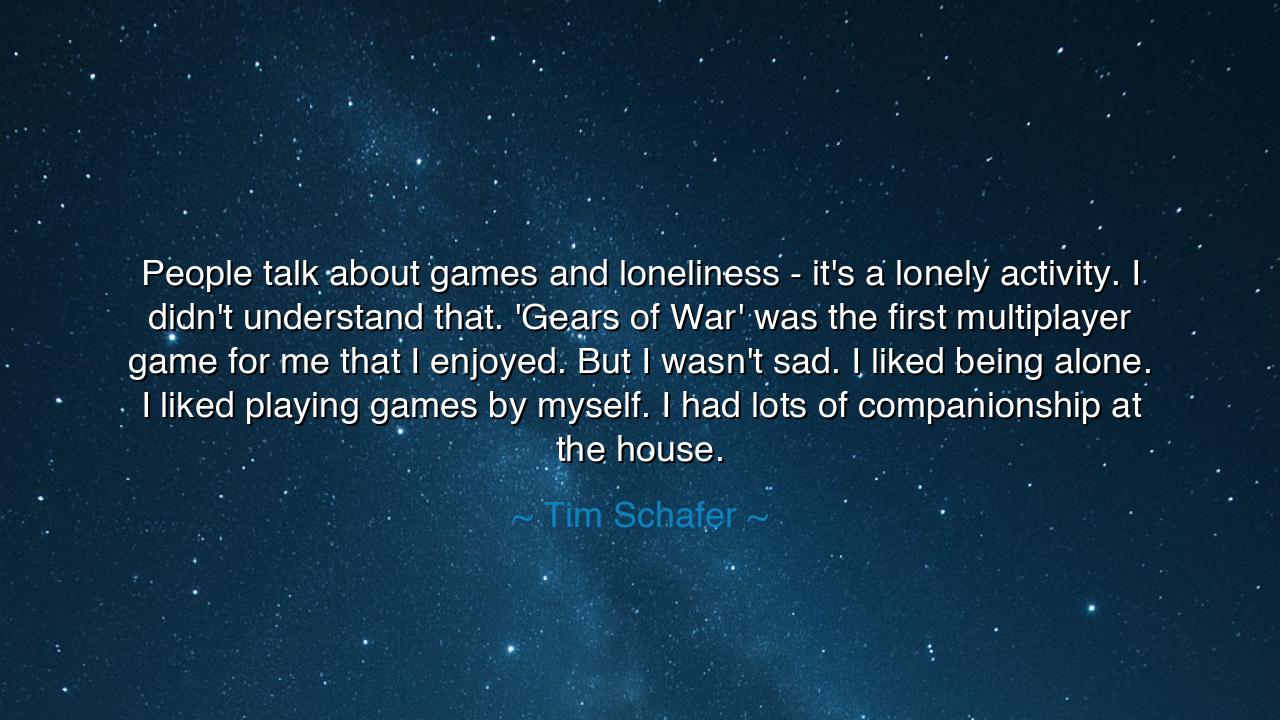
People talk about games and loneliness - it's a lonely activity.
People talk about games and loneliness - it's a lonely activity. I didn't understand that. 'Gears of War' was the first multiplayer game for me that I enjoyed. But I wasn't sad. I liked being alone. I liked playing games by myself. I had lots of companionship at the house.






Hear, O seekers of understanding, the words of Tim Schafer, a creator of worlds and teller of digital tales: “People talk about games and loneliness—it’s a lonely activity. I didn’t understand that. Gears of War was the first multiplayer game for me that I enjoyed. But I wasn’t sad. I liked being alone. I liked playing games by myself. I had lots of companionship at the house.” At first glance, these are musings on play and solitude, yet within them lies a teaching about the soul’s relationship with aloneness, community, and the freedom of self-chosen worlds.
First, let us reflect upon the charge: that games are a source of loneliness. Many believe that to sit before a screen, to play alone, is to separate oneself from society, to withdraw into shadows. And indeed, for some, this is true. But Schafer denies this judgment, reminding us that solitude does not always mean sorrow, and that not all who dwell alone dwell in despair.
Behold his revelation: I wasn’t sad. I liked being alone. In these words lies the ancient truth that the human heart holds different needs. Some find strength in constant gathering, others in quiet solitude. The one who delights in aloneness is not broken, but simply shaped differently by nature. To sit with oneself in peace, to lose oneself in creation or play, is not a curse but a blessing, if the spirit is content.
He speaks also of Gears of War, the first multiplayer game he truly enjoyed. This marks not a rejection of solitude, but a widening of experience. Just as a wanderer may one day join a caravan, so too did Schafer find joy in fellowship through play. Yet he returns to his truth: even without it, he had companionship—not from strangers across the internet, but from those who shared his home and life. Thus he shows us that connection comes in many forms, not only from the avenues society prescribes.
Consider the story of Henry David Thoreau, who retreated to Walden Pond to live in solitude, building his cabin with his own hands. Many thought him lonely, cut off from the pulse of society. Yet Thoreau declared that he was never truly alone, for he had the company of nature, of his thoughts, and of the rare visits of friends. Like Schafer, he shows us that solitude, rightly embraced, is not emptiness but fullness—a chance to discover strength in one’s own company.
The meaning of Schafer’s words is thus: we must not confuse solitude with sorrow. The sadness of loneliness is the absence of desired connection, but the peace of solitude is the presence of self-chosen stillness. Games, books, walks, crafts—these can be companions as much as people, if the heart receives them with joy. And true companionship may lie not in numbers, but in the quality of those who share one’s life at home.
So I counsel you: do not fear being alone. If solitude calls to you, embrace it without shame, and let it strengthen you. If fellowship calls, seek it with joy. And when others tell you that your path must mirror theirs—that you must always gather, or always join—remember Schafer’s wisdom: that happiness lies not in conforming to the world’s idea of connection, but in knowing where your spirit finds rest. Thus shall you learn to walk both with others and with yourself, never lonely, but always whole.






AAdministratorAdministrator
Welcome, honored guests. Please leave a comment, we will respond soon